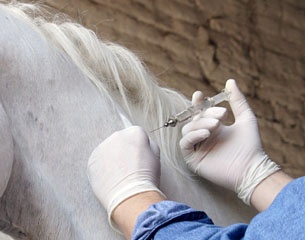
The Hendra virus and its vaccination have become the topic of serious and ongoing debate in the Australian equine world, initiated when the Equestrian Australia national board adopted a new by-law outlining the Hendra vaccination requirements for horses which attend EA and FEI sanctioned events held in Queensland and New South Wales.
For events in other states only horses that have travelled from Qld and NSW would need to be vaccinated.
Equestrian Australia (EA - the Australian equestrion federation) are currently attempting to enforce mandatory vaccination for all federation members who wish to compete at public FEI and EA events in Qld and NSW, based on its commitment to creating policies and by laws that increase safety, mitigate risk and are, according to them, in the best interest of its members and the sport.
EA decided to delay the implementation date of the Hendra Vaccination By-Law after the raging debate it caused amongst member parties, although it maintains that the government, veterinary and researcher advice is that vaccination is the single most effective way to prevent Hendra disease.
What is Hendra Disease?
So what is Hendra and why is this issue causing so much controversy? It seems simple. There is a virus, there is a vaccination, problem solved! However the logistics are far more intricate.
Hendra is an emerging disease that was first identified in Australia in 1994 and since its beginnings it has been the cause of 80 known horse death fatalities, 30 of these in the last two years.
What is even more scary about this virus is that it is classified as a zoonotic disease, meaning that it can be passed from animal to human and since Hendra first arose seven humans have been infected with four of them dying. The other three have lost the majority of their functional life.
Rabies, anthrax, ebola, are all names we're largely familiar with and while Hendra has not earned itself much recognition at present, it has a biology that is not yet fully understood. Still it is in the same category as the Ebola virus (a BSL 4 Pathogen, with no treatment).
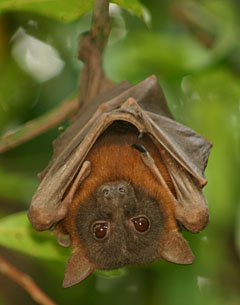 The virus occurs naturally in the majority of Australian flying fox populations and is thought to be transferred to horses through contaminated flying fox urine, faeces or birthing products.
The virus occurs naturally in the majority of Australian flying fox populations and is thought to be transferred to horses through contaminated flying fox urine, faeces or birthing products.
The majority of humans affected were vets or vet assistants because in order to contract the disease from a horse you must be in close contact and be infected via respiratory secretions, blood, urine, saliva, and faeces. At present there is no evidence that a human can contract the virus from another human or a flying fox. One might assume that it is a relatively small risk virus, but before 1994 the disease didn’t exist and it is has now worked its way from Queensland down into NSW, with no cases yet reported in Victoria.
In addition to the lack of biological knowledge of this disease the symptoms of Hendra are varied and non-specific. Symptoms range from a slightly depressed appearance and high rectal temperature to colic or respiratory disease like travel sickness. Therefore is rather identical to a lot of other common horse ailments. Also the horses experience an incubation period of up to 16 days, which means from exposure with the bat body fluid to symptoms of illness in the horse there are up to 16 days. Horses can only spread the virus from their body from 72 hours prior to the onset of symptoms through to death. So why, during this time, would a vet wear the protective gear, if the horse is showing no signs of the Hendra virus?
Controversial Vaccination
The good news is there is a vaccine, the bad news is the vaccine is almost as controversial as the virus itself.
Equivac HeV was released late last year by the pharmaceutical company Zoetis which has manufactured a commercial vaccine based on the successful CSIRO study. It essentially interrupts the cycle of transmission from flying foxes to horses and from horse to horse. The vaccine costs around 140 AUS dollars for the initial two doses and 70 AUS dollars for the 6 month booster without taking into account any vet costs.
It has now been reported that some vets in Queensland will not go out to treat a horse unless vaccination can be proven, which is possible due to a microchip and national database system that enables vaccinated horses to be easily identified.
Australian team vet Nathan Anthony adds that, "all equine hospitals in QLD are now restricting access of certain sick and some colic cases in unvaccinated horses and as of 1 January 2015 all of the major insurance companies have implemented a Hendra exclusion, that means that if there are delays in life saving treatment due to lack of proof of vaccination, then the policy will not pay out for mortality."
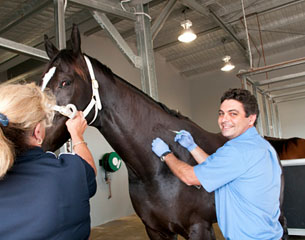 These veterinary care restrictions have led to some people accusing vets of only wanting to make money from the administration of the vaccine. Other people are scathing that some vets are overly cautious and refuse to treat horses purely because "four people have died." Vets know that if they become infected with Hendra they might die. So why should they put their lives at risk when a vaccine is available ?
These veterinary care restrictions have led to some people accusing vets of only wanting to make money from the administration of the vaccine. Other people are scathing that some vets are overly cautious and refuse to treat horses purely because "four people have died." Vets know that if they become infected with Hendra they might die. So why should they put their lives at risk when a vaccine is available ?
To gain some more understanding I talked with vet Tim Myers, who grew up in central NSW and was a practicing vet in the area for ten years. As he is no longer practising there, he has no financial interest or political gain from the Hendra vaccine.
“Hendra is concerning because it is so lethal to both horses and humans, but also because so much is still unknown about how it spreads," Myers explained. "There has been flying foxes found down south (including Melbourne!) that have tested positive to Hendra but it is unclear why the disease hasn't spread from them to horses in these southern areas.”
Tim says that if he were to treat a horse that had shown Hendra-like signs and had travelled from a Hendra area he would be thinking twice. He adds that one could never guarantee that a horse is safe from Hendra anywhere until we learn more about the disease and its transmission. At the moment one can only identify low and high risk areas.
Tim agrees that the vaccine has is drawbacks, mainly that it needs to be given every 6 months by an accredited vet so this becomes costly, but adds that the side-effect, which it rarely causes, are vaccine site reactions which are "very much the same for any equine vaccine."
“The vaccinating vet is required to register any adverse reactions stemming from the vaccine and data from the first 22,000 doses of the Hendra vaccine administered to horses resulted in only 55 reports from horse owners and veterinarians, with 53 horses categorised as having had a side-effect," Myers added.
Tim says that as the majority of these reports involved injection site swelling and such side affects are the standard risk involved with any injection in a horse. Given the adverse event rate stands at approximately 0.24%, this is in-line with the expected adverse event rate for most vaccines.
"The good news really is that a vaccine actually exists and works well and I think horse owners should be thankful for that," Tim added.
Hendra Vaccine Uncertainties
We have a vaccine, we have a database to prove it, it should be simple. Not really.
Firstly the vaccine has been granted a minor–use-permit from the Australian Pesticides and Veterinary Medicines Authority (APVMA) to allow it to conduct widespread field trials, further establishing the safety and efficacy of the vaccine. Under this permit the vaccine is only allowed to be administered by registered veterinary surgeons, who are required to complete an online training and accreditation package.
Many feel that a minor-use-permit is just a fancy way of calling it an "extensive on field trial," meaning that there is still information about the vaccine that they don’t know. Australian team vet Nathan Anthony debunks this.
"This is definitely not true," said Anthony. "Minor use permits can only be granted if there is strong scientific evidence that the vaccine works. This was provided by the CSIRO."
Spokesperson for the APVMA confimed Nathan’s belief, stating that before issuing a permit the APVMA must be satisfied that the product, when used as proposed, would meet certain criteria including that the product would not be likely to have an effect that is harmful to people and would not be likely to have an unintended effect that is harmful to animals.
“Trial safety data met the safety requirements when the permit was issued subject to the operation of strict conditions,” says Alan Norden, Acting Executive Director, Registration Management and Evaluation for the APVMA.
Nathan added that it was the lack of known duration of immunity that was the reason that the vaccine could not be fully registered from the start.
“The CSIRO has now conducted the research and provided the APVMA with the results of 6 month and 12 month boosters,” said Nathan.
At present the vaccine is proven by the CSIRO and accepted by the APVMA to remain effective for 6 months. There seems to be much written about the instructions that the first two doses must be given exactly 21 days apart, but it is actually 3-6 weeks apart which gives normal leeway.
Vaccination, however, still leads to a positive Hendra antibody test reading and a DIVA (Differentiate infected versus vaccinated animals) test is not yet available.
Outcry Against Hendra Vaccination
Many of Australia's top dressage riders are speaking out against the implementation of mandatory vaccination laws. Four time Australian Olympian Mary Hanna is very disappointed that the EA wishes to make this vaccine mandatory, when it is a “raw untested and unregistered vaccine, which has caused many horses to become sick or die, and in some cases render the horses so sick they can never compete again."
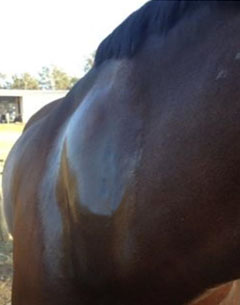 “I have no concerns about my horses catching the virus as I live in the Southern part of Australia where there has never been a reported case of Hendra. I am not concerned that my horses will get the virus at a show because there are no cases EVER of any horses passing on the virus at any show or race meeting. I am however deeply concerned that the EA have attempted to coerce the FEI into making it mandatory to vaccinate if attending a CDI here," Hanna expained. "I will not under any circumstances vaccinate my horses or my clients' horses."
“I have no concerns about my horses catching the virus as I live in the Southern part of Australia where there has never been a reported case of Hendra. I am not concerned that my horses will get the virus at a show because there are no cases EVER of any horses passing on the virus at any show or race meeting. I am however deeply concerned that the EA have attempted to coerce the FEI into making it mandatory to vaccinate if attending a CDI here," Hanna expained. "I will not under any circumstances vaccinate my horses or my clients' horses."
Hanna explained that horse racing, one of Australia's largest industries, refuses to make vaccination mandatory. "So do all other branches of Equestrian sport," she continued. "The EA is the only governing body to attempt to do this. The DPI who represents the government on these types of issues also do not see a reason to make vaccination mandatory.”
Australian WEG team rider Maree Tomkinson is also against the vaccination, not only for the welfare of her horses, but because she feels if it becomes mandatory she will be unable to remain an Australian based international rider with aspirations to continue representing her country abroad.
“The risk will be too great for the ongoing health of my horses. At the same time, I am not in a financial position to relocate my entire team to Europe or America so I am not sure where that leaves us at this point," Tomkinson stated.
There are many others in the Australian horse community who agree with Mary and Maree, and are very concerned about the level of safety of this vaccine.
Daphne Nimmons-Marvin from Victoria wrote directly to company Zoetis after swelling and stiffness at the reaction site made it impossible for her Prix St Georges horse to put his head down or eat.
“The injection site had a massive lump and when you touched his neck he was in pain,” Daphne told Eurodressage. She did disclose that the same horse also had an injection site reaction to the west Nile vaccine, but not to this extent. She would never have authorised this vaccine had she known the possible outcome, especially since the vaccine is still in experimental stages.
“Three other horses in the barn had what I would call minor site reactions with golf ball sized lumps. In performance horses this to me is still unacceptable as any sort of soreness can cause huge stiffness that requires lots of rehabilitation," Daphne added.
To add weight to the concern of our top riders, veterinarian Dr Jenni Ahmat has over 30 years experience in general mixed practice and she fully understands the science behind the threat of Hendra virus. As she is not currently involved in running a veterinary practice she has no vested interest whatsoever in promoting the vaccine.
“As I live in WA I do not vaccinate my horses for Hendra nor anyone else's. I do not therefore see vaccine reactions to Hendra first hand. However there are just so many highly experienced horse owners I know who are describing far too many negative responses to this vaccine and most concerningly once horses are having their subsequent boosters," Ahmat explained.
"The subtle change in behaviours and loss of form, that are being reported for high-end athletic pursuits such as jumping and galloping, are far too alarming to risk giving the vaccine to these valuable equine athletes. There has just not been enough research done with it and the vaccine is currently unregistered. On this basis I oppose the mandatory policy that is being contemplated until the proper amount of research has been done."
Ahmat is now a manager of an elite level show jumping stable and is hands on in the competition world. "Most vets including those on the EA board are not," said Jenni. "Only horse owners who are financially committed up to their eyeballs in these upper level horses fully get what they might risk losing with this vaccine that is so clearly irritating and potentially toxic to some horses randomly. It is an unacceptable situation."
Jenni also pointed out another reality that steps must be made to cull the flying foxes as they are actually in plague proportions. However due to current policy this will not happen and she feels the equine world is suffering as a direct result. “Bats are fully protected and no one will take responsibility for the fact that they are a plague," she concluded.
The Facebook site "Say No to mandatory Hendra" also states “say yes to a safer vaccine." With 3000 members, many of whom are elite Australian riders, it seems that there are many willing to speak out against the position of the Australian equestrian federation.
The Hendra Vaccine Supporters
Some of Australia's top riders have chosen to vaccinate, among then Grand Prix partners Heath and Rozzie Ryan.
“We vaccinated quite a lot of horses and didn’t really have any side effects,” Rozzie told Eurodressage. “We were pretty careful though, and gave them all a couple of days off.”
Australian Team Vet Nathan Anthony believes the vaccine should be made compulsory for Queensland and NSW horses attending equestrian events and race meetings.
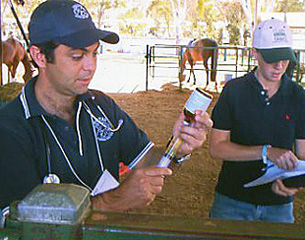 “Event organisers are required to provide a safe environment for competitors, volunteers and officials and the biosecurity plans that are currently in place do little to prevent Hendra risk. Although Hendra infection in people is a rare event, the consequences are devastating with more than 60% chance of mortality. Hendra infection in horses is no longer considered a rare event; there have been 38 outbreaks in the last 4 years, all infected horses are dead and many more horses and people were put at risk."
“Event organisers are required to provide a safe environment for competitors, volunteers and officials and the biosecurity plans that are currently in place do little to prevent Hendra risk. Although Hendra infection in people is a rare event, the consequences are devastating with more than 60% chance of mortality. Hendra infection in horses is no longer considered a rare event; there have been 38 outbreaks in the last 4 years, all infected horses are dead and many more horses and people were put at risk."
Nathan is also adamant that the vaccination is very safe, and there have been more than 300,000 doses administered in the last two years with very few horses suffering serious reaction. A vaccinated horse is not a carrier of the Hendra virus. Furthermore, it has been recorded that most side effects occur when the vaccine was used in conjunction with other products.
As Australian team vet at many major championships, Nathan asked the direct question: will vaccinated horses be able to compete at the 2016 Olympic Games? The answer is in line with EA’s official stance, that Brazil does not have quarantine legislation which excludes Hendra vaccinated horses and that Hendra vaccinated horses can currently also travel without restriction to the UK and Europe, New Zealand and America.
“We are planning to fly our Australian based horses via Europe and we know with certainty that we can take a vaccinated horse into Europe," Nathan added. "Besides the FEI always ensures that host countries soften quarantine requirements to ensure participation of all qualified nations. Sydney 2000 was an example of this despite Australia having the toughest quarantine requirements of all. Hong Kong and Singapore have recently changed their policy to accept Hendra vaccinated horses prior to importation."
Transportation of Horses World Wide
So if supposedly these horses can travel and the vaccine can prevent vets and horse handler's lives being put at risk, then why isn’t the government supporting the EA’s move to make vaccination mandatory? This is where it gets more complicated
Chris Burke, who is head of IRT, Australia’s largest transport company which has been operating for over 40 years with bases in the USA, New Zealand and Europe, has been in the shiping business for almost two decades.
“My job is to work out the logistics of moving horses between countries,” said Chris. “The main biosecurity issue involved in equine export and import, is which diseases might be transferred between two countries and put local horse populations at risk. Right now some countries ask for negative blood test for Hendra virus before a horse leaves Australia. However Singapore and Hong Kong will now also accept vaccinated horses or a negative blood test, so it is not a requirement to importation”
The problem is that the antibodies from the vaccination cause a positive reading in blood tests. With the microchip and data system in place that seems easy to remedy. Wrong again!
 “I have lost countless of time and money because of human error in the database," Chris stated. "Twice we have had horses tested positive, which we had checked the microchip number against the vaccination in the database. As a result the whole herd couldn’t travel and we lost over $100,000 in airline cancellation fees and delays costs.”
“I have lost countless of time and money because of human error in the database," Chris stated. "Twice we have had horses tested positive, which we had checked the microchip number against the vaccination in the database. As a result the whole herd couldn’t travel and we lost over $100,000 in airline cancellation fees and delays costs.”
Turns out the vet entered one wrong digit and in another case the owner had asked for the vaccination to be made private, because of all the controversy surrounding it.
Burke added that it is not correct that the USA, New Zealand, and Europe will allow Hendra vaccinated horses to enter an that these horses can fly to Rio.
“The truth is that Australia actually has no requirement in its protocol requiring testing for the Hendra virus other than property freedom, as they feel this is sufficient protection to cover the risk. In regards to Rio, there is currently no valid protocol between Australia and Brazil, so it would be wrong to say that Brazil does or does not accept vaccinated horses. Beyond that it is logistically impossible to send a horse from Australia directly to Brazil, so a horse would have to stay a time in the USA or Europe to get to the Olympics in 2016 no matter what vaccine status.”
So why isn’t the government asking these countries to include a Hendra policy in their agreement and pushing for the vaccine to be accepted into these nations, should the Hendra virus grow?
“If another country phoned the Australian government and said, 'look guys, we have this vaccine, it’s not yet fully registered, can you include it in your policy,' we should say call us back when it is registered," Burke stated. "The Australian government are therefore limited in the approaches they can make to other countries' biosecurity departments regarding the vaccine until the vaccine has been fully tested, approved and registered!”
Neither for or against the vaccine, Chris said he would love to better protect his staff and thinks a vaccine is great, but stated that all in all the introduction vaccine has been poorly managed and until it is fully registered it is unrealistic to make it mandatory.
“If there was a vaccine that was registered and proven to be effective, and there was a DIVA test to prove quickly if the horse was positive from vaccination or virus, then yes I would not be against it, better to protect my staff and my horses," Burke concluded.
Nathan Anthony added that full registration is immanent and that he suspects with the delay to the implementation of the EA ByLaw it most likely would now not be introduced prior to full registration.
“The reality is that lack of full registration has been misinterpreted by some as lack of evidence of safety and efficacy; and this is not the case. The only thing that has not been decided on by the APVMA is whether a 12-month booster will replace a 6-month booster. If the vaccine remains six monthly, the public health and horse welfare benefit aren't changed and the justification for the By law stands.”
EA's Bold Move to Make Hendra Vaccination Mandatory
I wondered why the EA is pushing to make the vaccine mandatory, given that we are still waiting on full registration?
“If a Hendra fatality resulted at an Equestrian Event tomorrow, those responsible for the safety, the event organisers or maybe the EA Board, would have to justify their position at a coronial enquiry. Although vaccination is not legislated, all government agencies (Biosecurity, Health, Work Health and Safety) have documented and advised that vaccination is the single most effective way to mitigate Hendra virus risk, with significant public health and work health and safety benefit," said Nathan Anthony.
Anthony reckoned that at the Brisbane CDI in July 2014, for example, 88% of the horses were vaccinated and that those who are vocally against vaccination are the far minority.
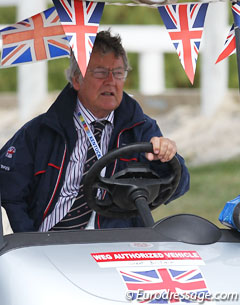 John McEwen, chair of the FEI Veterinary Committee, says there is always a cost to vaccination as there is to all aspects of horse ownership.
John McEwen, chair of the FEI Veterinary Committee, says there is always a cost to vaccination as there is to all aspects of horse ownership.
“There is also a cost when vaccination policies are not in place. Influenza vaccination policy has had a very positive effect on the horse population. Pre vaccination we would loose many competition days and days racing, we also saw a lot of horses damaged permanently by the virus. Mass immunity in the competition world has been very effective," McEwen stated.
Hendra survivor Nathalie Beohm says every part of her life has been affected by the virus. She has been lucky to be able to learn a bit about the vaccine and feels it is quite remarkable.
“If the uneducated people saw the virus and what it can do to horses and people, they wouldn't be questioning vaccination," Beohm said. "They may never get Hendra, but if you do you cannot turn back or stop the Hendra virus once it has taken over the body.”
As for the belief that you need to be operating on a horse or really be in contact with blood and urine to contract the virus, Nathalie denies those beliefs.
“I never worked on a horse when it was showing signs of the virus, but I did clinic work (not operative work) on them in their incubation period.”
Currently the vaccine remains a choice. If owners do decide to vaccinate, they should be aware and proactive in order to better protect their horses. Discuss with your vet what the best vaccination conditions are for each individual horse to prevent side effects.
by Sarah Warne for Eurodressage
Related Links
Equestrian Australia Gives Update on Hendra Vaccination and Biosecurity Policies
Equestrian Australia Welcomes Release of Vaccine for Hendra Virus